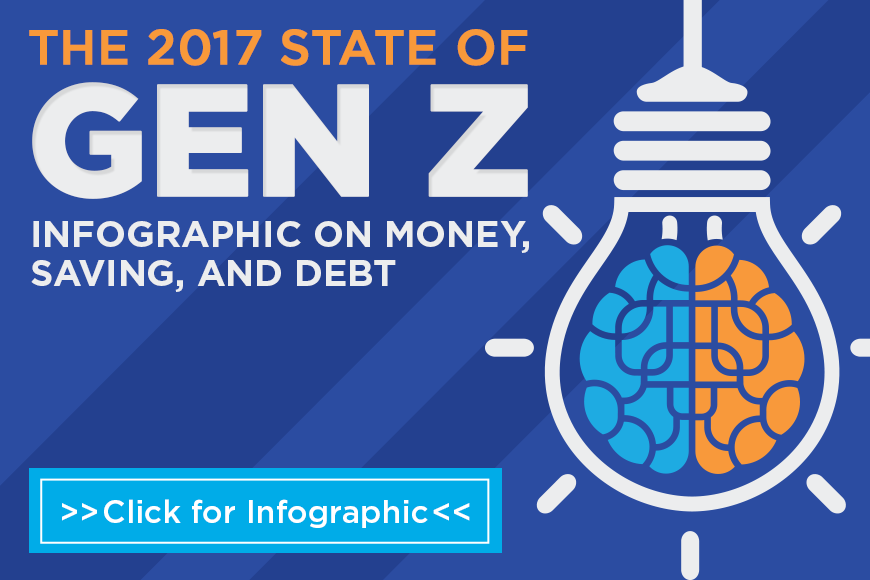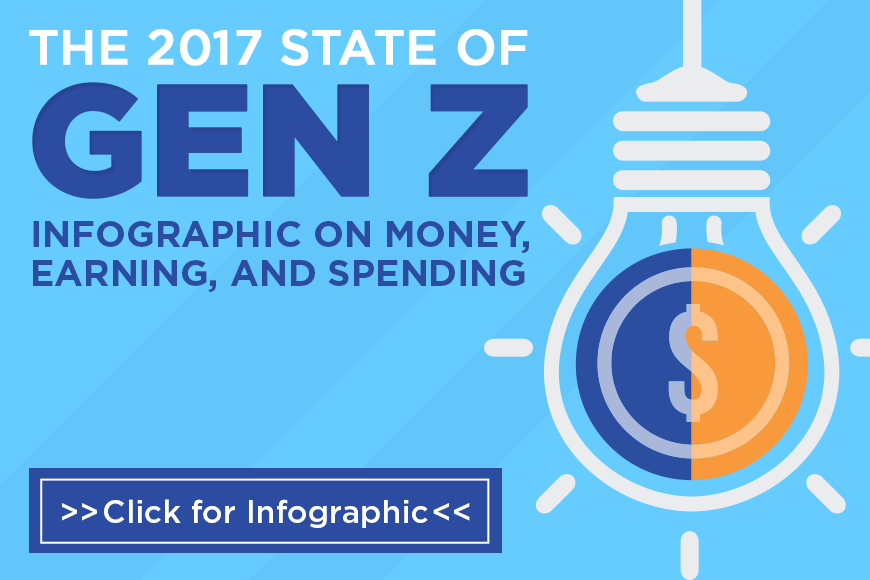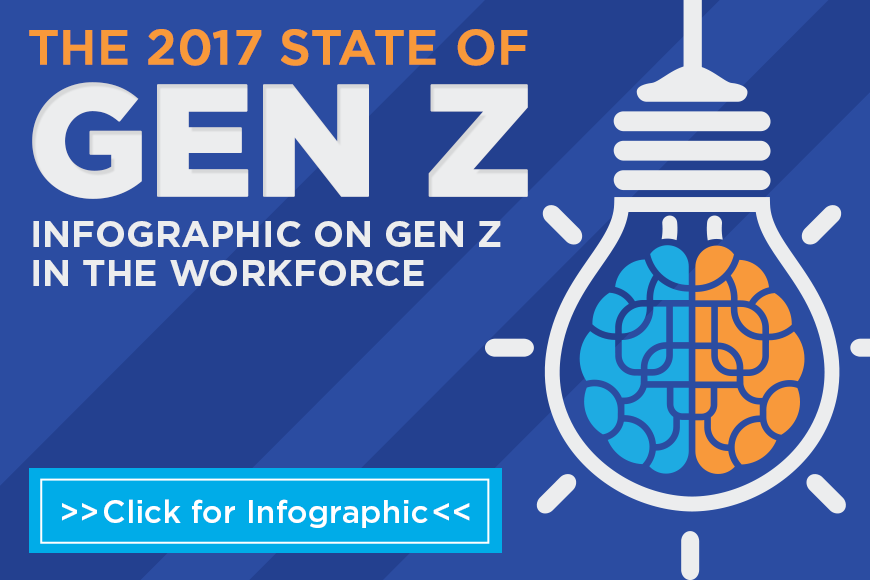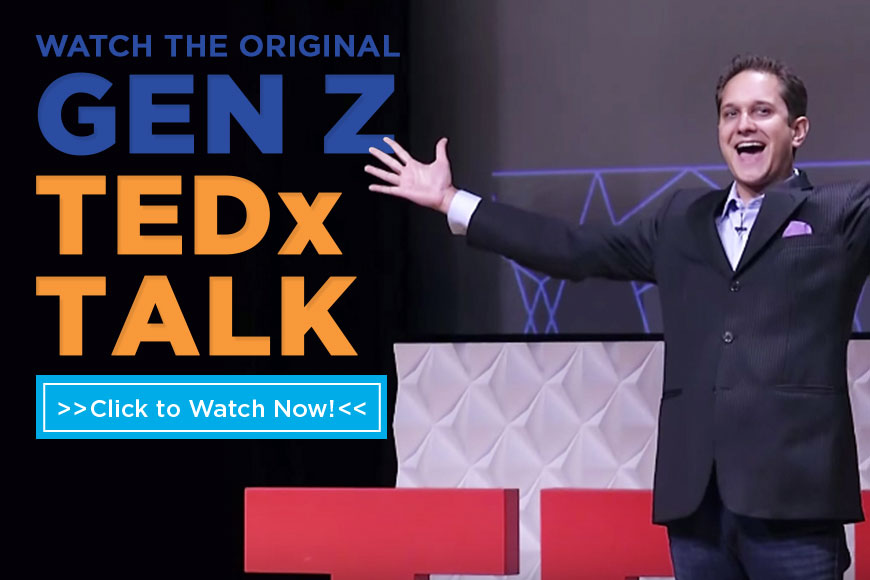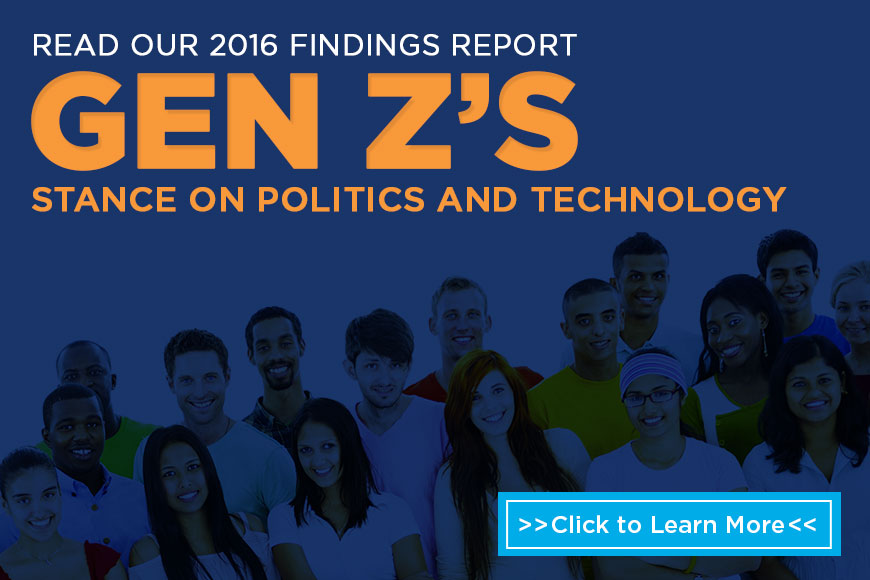Gen Z White Paper – The State of Gen Z® 2017 National Research Study
Welcome and Quick Overview
One of the most startling discoveries from this year’s new national study: Gen Z is shaping up to be the Throwback Generation.
That’s right. They are exhibiting attitudes, beliefs, and behaviors that combine their tech-saturated world with elements of generations past. The results are shocking. But before we jump into the national study findings, you might be wondering: How do we know where the Millennial generation ends and Gen Z begins? At The Center, our extensive consumer and employment research on Gen Z and Millennials has uncovered numerous trends, factors, and generation-defining experiences that have begun to show clear pathways separating the two generations from one another. The biggest, most important generation-defining event that separates Millennials from Gen Z is the terrorist attacks on September 11, 2001 in New York City, Washington D.C., and Pennsylvania.While 9/11 is the defining moment for Millennials, Gen Z does not remember it at all.
If a person does not remember a defining event and does not have a strong emotional connection to it in real time, then it has always been history to them—meaning they’re not part of the contemporary generation of that event. This means that 1996 is the first birth year of a new generation, Gen Z. If a person was born in 1996 or later, they would not remember 9/11 firsthand; instead, it’s a history lesson they watched on YouTube or learned about in school.What are the birth years for Gen Z?
At The Center, we believe Gen Z was born from about 1996 to somewhere between 2012 and 2015. We are not certain of the end date yet, but will discover it as the generation continues to emerge. What we do know is that our annual State of Gen Z® national research study in 2017 revealed some very important special characteristics of Gen Z that every generation, including today’s marketers, employers, parents, and leaders, must know.What did we study in The State of Gen Z® 2017?
In our second annual State of Gen Z® research study, we focused on two primary areas that are driving change, challenge, confusion, and opportunity across generations: 1. Gen Z as consumers and their views toward money and spending 2. Gen Z’s views on a variety of contemporary issues We studied these intersecting viewpoints because our Gen Z research and consulting clients—ranging from global banks and high-profile retailers to restaurant chains and car manufacturers—are already seeing tremendous differences in how, when, and why Gen Z makes purchases. Gen Z’s attitude toward spending is grounded in their present views of the world, so we wanted to explore what the data says is really going on with Gen Z in these areas.Were we surprised by the findings?
Absolutely. We are passionate about asking interesting questions and letting the findings speak for themselves. These findings definitely included some surprises! It was particularly interesting for our Center’s Gen Z research, consulting, and speaking leaders because we employ four generations in our office, including Gen Z. In addition, our research directors have Gen Z children and we work with numerous brands that are heavily marketing to, selling to, and employing Gen Z. In essence, we get to see Gen Z in our roles as Ph.D. researchers, market researchers, and workforce consultants, as well as employers and parents. In the following State of Gen Z® 2017, you’ll see our favorite findings from this year’s national study. The study included 1,004 Gen Z completes and 1,000 Millennial completes for a margin of error of +/-3.1. There are many additional Gen Z findings we will release in our upcoming Gen Z book, keynote presentations, and future collaborations. You can find all of our latest public research releases at GenHQ.com/Gen-Z. If you want to know how to apply this Gen Z research to your company, request information on our Gen Z speaking or consulting, or schedule a media interview with our experts; click here to contact our team. At The Center, we are passionate about bringing truth and data to the generational conversation to make the contributions of every generation more valuable. Thank you for joining the movement to unlock the potential of Gen Z through original research.Part 1: Gen Z’s Attitudes about Work
Gen Z may be the youngest generation today, but they are already showing a knack for making their own money. In our national study we found that 77% of Gen Z (people ages 14 to 21) currently earns their own spending money through freelance work, a part time job, or earned allowance. This is a powerful finding because we discovered that the percentage of Gen Z members who are earning and spending money is about the same as the Millennials we surveyed, who are ten years older! Discovering that Gen Z is actively working to earn money at a young age, whether through chores, employment, side jobs, or freelancing is exciting—particularly since most members of Gen Z are currently teens or pre-teens. While these numbers may not be reflected in the national employment rate, which is calculated differently than the question included in our national study, seeing such strong parity between the work lives of Gen Z and Millennials at this early stage is exciting. This shows that Gen Z is on a solid path for connecting effort and work with the outcome of earning spending money, and at a young age. This bodes well for Gen Z’s future self-reliance and long-term contribution to the economy, as well as for employers. In addition, earning money, even if in an informal work arrangement, gives Gen Z valuable job or work experience and provides them exposure to work-related interactions at a young age.What skills do Gen Z members believe they need to succeed?
When we asked members of Gen Z what they think are the two most important skills for succeeding in the workforce, they answered: 1. Communication (57%) 2. Problem-solving (49%) All those talks about what a person needs to be successful at work from Gen Z’s teachers, parents, and influencers must have gotten through to this emerging generation. Employers frequently said that the previous generation, Millennials, needed better communication and problem-solving skills. Maybe this message got through to Gen Z at the right time? It was, however, interesting that skills such as reading and other traditional areas of expertise were not at the top of Gen Z’s list. This may suggest that Gen Z recognizes that the workforce they’ll be competing in requires different skills in addition to reading or math—or maybe they simply think Siri will do the basics for them? To contrast with the two most important workforce skills Gen Z thinks they need, we also asked Gen Z to identify skills they think they need to improve. The two skills Gen Z said they wished they were stronger in are: 1. Public Speaking (50%) 2. Communication Skills (45%) Oddly enough, problem-solving dropped down to 29% when the question was asked in this way. What we see is that public speaking is a fear and concern—even for a generation that has grown up using FaceTime and being exposed to virtual reality as the future. It’s apparent that some fears or areas that need to be improved seem to stay the same across generations, or at least continue with this new generation! While Gen Z is on target with some of the key skills they think they need to compete in an innovation- or knowledge-based economy, some of these same skills are the ones where they say they most need help! This presents a clear area where employers, parents, and educators can help Gen Z become more confident and successful in the workforce through training and preparation.Where does Gen Z go to learn skills?
It’s not just college. In fact, 85% of Gen Z watched at least one online video in the past week to learn a new skill. While we don’t know how much of this viewing is done on YouTube, it paints a picture of how integral the digital world is to the life of Gen Z—even in seemingly simple things like learning a new skill—and how this might translate into trust, even trust in advertisements.Millions of members of Gen Z plan to work during college
College is a key transition for many generations and it will likely continue to be so for Gen Z. While attending college may look very different ten or fifteen years from now, in its present form our ideas about college transcend generations and remain important in the minds of those Gen Zers preparing for college. In addition to working during college, how does Gen Z plan to pay for the cost of college? Our national study found that 24% of Gen Z says they will pay for college through personal savings. This represents a lot of relieved parents, but we’ll have to wait ten or more years to see if Gen Z graduates with less college debt than the recent historic uptick led by Millennial graduates. Does Gen Z plan to work during college? Across the US, 38% of Gen Z says they do. This is a good starting point, but the number will likely change as more members of Gen Z enter college and begin to understand the financial realities of needing to work while in school.What does Gen Z most want in a job?
When we asked Gen Z what they most want in a job, the answers were right in line with their generational characteristics and life stage. Nearly half of Gen Z says they would be most excited to apply for a job with a: 1) fun work environment (47%) and 2) flexible work schedule (44%). These two responses trumped all others, including paid time off, promotion opportunities, and job training. It’s fascinating that Gen Z and Millennials want similar work perks. When asked in our national study, the two things Millennials say would make them most excited to apply for a job are: 1) a flexible work schedule and 2) paid time off. The discovery that Gen Z wants similar workplace characteristics to Millennials should be a warning sign to companies that the changing employment priorities are not going to stop, but will in fact continue, with Gen Z. This could be particularly difficult for employers that have resisted adapting to Millennials, because now those same employers will have two different generations wanting similar work experiences.Gen Z is already thinking about retirement (seriously)
As young as Gen Z is right now, they are already aware of the term “retirement.” This word is ever-present in the news as Baby Boomers transition into this phase of life, and now even Gen Z’s parents are talking about it as they look ahead. So what does Gen Z think about retirement? Not only are they thinking about it, they’re thinking about how they’ll spend theirs! Gen Z is expecting money from multiple sources to fund their retirement. More than half of Gen Z (52%) plan to use personal savings for retirement, 28% will continue to work in some form after retirement, such as freelance, part-time, or contract work, and 26% believe they will receive government assistance. Note how this compares to Millennials, who are up to ten or more years older and have much more working, spending, and saving experience. Millennials report being much more likely than Gen Z to rely on all three of these sources, including government programs with 59% planning to use retirement savings, 34% planning to continue working, and 33% relying on government programs. Discovering that Gen Z is already thinking about retirement bodes very well for both Gen Z and the US in general. Recognizing the need to save for retirement early is the key to being prepared if Social Security or other government programs are not available 50+ years from today. Gen Z needs to be saving for retirement early. It appears this message has started to get through to them even though the very oldest members of Gen Z are still only college age.Is Gen Z taking any action to save for retirement now?
Yes. In the national study, a surprising 12% of Gen Z is already saving for retirement. That is a much bigger number than one might anticipate given the youth of Gen Z in the study, who are ages 14 to 21. Diving further into the question, it was discovered that 35% of Gen Z plans to start saving for retirement when they are in their 20s. This insight shows that Gen Z is thinking proactively in terms of starting to save early in order to be able to retire one day. However, the number of Gen Z planning to start saving for retirement needs to go way above 35% in their 20’s if the generation is going to have enough time and accumulated financial resources to one day retire comfortably. On the other hand, the fact that any members of Gen Z are already saving for retirement is both startling and exciting. Especially when that number is over 1 in 10—and we’re studying members of Gen Z as young as 14! These numbers show both the promise and room for improvement the generation has when it comes to paving a path toward retirement.Part 2: Gen Z’s Attitudes about Money, Debt, and Banking
We now know that 76% of Gen Z is earning their own money through part time work, but what does Gen Z actually think about money and debt? Do they think about personal financial concepts such as debt, financial education, banks, and payment apps?Gen Z and debt: 1 in 5 say it should be avoided at all costs
In the study we found that Gen Z is already thinking about debt, defined as money that is owed or due on a purchase that has already been made, such as credit cards, student loans, home mortgage, etc. In fact, 29% of Gen Z believes that personal debt should be reserved for a few select items and 23% believe personal debt should be avoided at all costs. As the conversation around debt has become the subject of family discussions and national news, views about debt have reached down to the youngest members of the generation that we were able to survey, those aged 14. We see the pendulum swinging back from the Millennials’ “college debt is a part of life” mentality to over 1 in 5 members of Gen Z saying that personal debt should be avoided at all costs. This is a good development for Gen Z in terms of future workforce mobility and savings potential. Taking on, managing, and paying down debt has, despite its dangers, historically proven important—if not essential—to building the credit history needed to make large purchases such as cars and houses. Many Millennials have found themselves with limited credit histories because they have not used credit cards or other forms of revolving credit. It will be interesting to see if Gen Z begins to build a credit history early or if the credit rating industry adapts to this new generation that does not think about credit in the way previous generations did.Parents are the source of Gen Z’s financial education
While Gen Z may often be glued to their favorite screen watching YouTube, Netflix, or some other digital channel, they are learning about financial topics from their parents. In our national study, Gen Z said their parents are the ones speaking to them about financial topics. In fact, 56% of Gen Z have discussed saving money with their parents in the past six months and 53% have discussed earning money with their parents. Unlike previous generations of parents who did not talk about money or financial topics with their kids, Gen Z’s parents have taken a very different approach. The fact that so many members of Gen Z are talking about money with their parents may represent a real shift in parenting perspective from the Baby Boomers to Gen X. It may also reflect the frustration or lack of preparation that Gen X (and even Millennials) felt when it came to personal finance and their own emergence into adulthood. Talking about personal finance is one of the best ways that parents can help their children to make better money decisions, and it appears that Gen X parents are heeding this advice with their Gen Z kids.Gen Z, banks, and payment apps
Banks may be one of the major legacy institutions that will have to adapt in order to best fit Gen Z. The good news is that Gen Z is showing that they are taking responsibility for their financial situation, or they are at least aware that money and banking go together. In the national study, we found that a significant 21% of Gen Z had a savings account before the age of 10! In responses to the same question, we also found that 48%, nearly half, of Gen Z has a money or payment app on their phones right now! That is a huge number given their relative youth, and it shows they are thinking about money as they enter adulthood. Here’s one area where Gen Z and Millennials have similar attitudes, as Millennials are also fond of money or payment apps. In fact, almost three-quarters of them do. So the question is: Will Gen Z herald the end of savings accounts, checking accounts, physical checks, and carrying cash as other generations have known these things? Even though these things are not going to happen overnight or likely even within the next several years, the answer is yes! Gen Z’s dependence on money and payment apps will likely only accelerate, as their generation appears to be comfortable with and actually desire a cashless reality. This makes sense because they have never known a time when you had to carry cash or write a check in order to buy something. Instead, you simply Venmo your friends what you owe them—along with your favorite emoji.
Will Gen Z actually visit a bank?
In spite of Gen Z’s love for all things mobile, 46% of Gen Z surveyed in the national study said they have been inside a bank in the past month. On the flip side, this also means that more than half of all Gen Z (people ages 14 to 21) have not stepped foot inside a bank in the past month. In contrast, 70% of Millennials have been inside a bank in the last month—showing a major divergence between the two generations. Maybe Gen Z is the generation that breaks the bank, literally! This divergence between the attitudes of Gen Z and Millennials to banks might be due to the different life stage of each generation or it could be that Gen Z truly believes the bank is their mobile phone. What will be most telling will be Gen Z’s banking habits and patterns as they enter their mid to late 20s and need more traditional banking services, from credit cards and family banking plans to home and business loans.Part 3: Gen Z as Consumers, Spenders, and Brand Trendsetters
Up to this point, we’ve talked about Gen Z in regards to work, retirement, money, and banking. What about Gen Z as consumers? What are their brand preferences and buying habits? How does Gen Z spend money? In The State of Gen Z® 2017, we dove into exploring Gen Z as consumers to see how they might be the same, different, or a hybrid of previous generations as they enter their prime consumer trendsetting years.Gen Z guys and girls spend money differently.
One of the more compelling insights our national study discovered was that Gen Z guys prefer to spend more on products than Gen Z girls, and Gen Z girls want to spend more on experiences than their male counterparts. For the purposes of the study, products were defined as clothes, electronics, jewelry, technology, etc., and experiences were defined as eating out with friends, going to the movies, attending concerts, etc. This is very similar to Millennials. Millennial men also are much more likely to spend their money on products, while the women are much more likely to spend their money on experiences. Since both generational groups align here, the data does suggest that companies should be thinking in gender specific ways as they market to the emerging adult crowd. For example, airlines and hotels might consider tweaking their marketing to more directly align with teenage women—and in doing so will end up creating the opportunity to align with Millennial women, too.Who most influences Gen Z as consumers?
Now that we know Gen Z guys and girls want to spend their money differently, we ask who or what most influences their purchasing decisions? One might guess that the answer is online ratings, reviews, and other user-generated content sources, but our national study has found that none of these are most influential. Actually, 48% of Gen Z, almost half, say they often or always get input from friends and family before making a purchase! This could be a generational statement about who Gen Z most trusts or it could be related to their current life stage. It will be interesting to see if this changes as Gen Z gets older and accumulates more consumer experience. However, we do know how this compares to Millennials. Millennials are only slightly less likely than Gen Z to ask for input on purchases—44% of Millennials say they often or always get the opinion of friends or family before making a purchase. Companies need to understand the huge importance that both Gen Z and Millennials place on purchasing input from friends and family.Who or what else influences what Gen Z buys?
Going deeper into the Gen Z consumer and shopper findings, our study discovered that 30% of Gen Z prefers to get information on a brand from a real customer of the brand and 19% from an online influencer, meaning a well-known blogger, YouTube or internet personality, etc. Contrast this with Millennials, who are even more likely to say they want to hear from a real customer and less likely to say they want information from an online influencer. What we see is that friend and family recommendations are the most influential source of brand choice for Gen Z and Millennials. However, the testimony of past customers and online influencers still command significant influence over Gen Z purchasers, much more so than the endorsements of celebrities or professional athletes.Don’t overlook YouTube
The Center’s national study found that 30% of Gen Z believes YouTube ads are more trustworthy than any other source of advertising, including television, print, radio, and social media. Considering how much time Gen Z spends watching online videos, this makes sense. Millennials, on the other hand, are more traditional, viewing television ads as being most trustworthy. In typical Millennial fashion though, social media isn’t far behind, chosen as the second most trustworthy source of ads.Ratings and reviews can close the sale with Gen Z
You’ve probably guessed that Gen Z puts a lot of confidence in online ratings and reviews—even though it is second to the influence of family and friends. When asked whether Gen Z used online ratings and reviews in the past 30 days to make certain purchases, their customer pathway is clear. Whether it’s to buy a product online (72%), purchase an item (78%), pick a movie (69%), decide not to purchase an item (66%), or eat at a restaurant (53%), Gen Z has strongly integrated online ratings and reviews into the fabric of their consumer decision-making (right after the influence of Mom, Dad, and friends!). 52% of Gen Z even uses ratings and reviews while shopping at a retail store to comparison shop or price match online while physically in the store. The question for companies, businesses, and retailers of all shapes and sizes and across industries is not if Gen Z will look at ratings and reviews, but when. Gen Z hardly makes a purchase without getting feedback from other customers, who they trust implicitly. This is a continuation of Millennials’ reliance on ratings and reviews. But unlike Millennials, it isn’t a practice that was added part of the way into their roles as consumers. Gen Z has never known anything other than the incorporation of these ratings and reviews into the consumer journey. For these consumers, it has always been a way of life. This makes ratings and reviews even more important for them.Conclusion and Recommendations
Gen Z will become even more influential than Millennials, but with a more practical mindset grounded in the present. They appear to be a true “throwback generation” that wants to work, save money, and not get stuck or trapped. Basically, as they told us during interviews, “We don’t want to end up like Millennials.” Marketers, managers, leaders, and others who think Gen Z will eventually “grow out of it” or suddenly start acting like previous generations should heed the warning of Blockbuster, Sears, and other legacy businesses that simply became part of the past within a single generation (thanks Millennials!). Gen Z will move faster and with even fewer ties to the way things were in the past because they simply do not remember a time before blazing-fast Internet speed, an African-American president, and being able to have anything you could possibly want delivered to your door with a single click (or not even having to click—just ask Alexa). This means the pressure is on other generations, including Millennials, to step up and pay close attention, begin to adapt swiftly, and do everything possible not to miss this huge Gen Z wave barreling toward them right now— as employees, customers, neighbors, voters, and citizens. All is far from lost, but choosing to delay a response or fail to make smart preparations now will only make the future more challenging for the non-Gen Z incumbent generations to employ, market, lead, educate, and influence this new generation. As we’ve seen through this State of Gen Z® 2017 national study, what Gen Z wants is evident. The leaders, brands, and influencers that adapt will be able to unlock the tremendous potential of this generation for decades to come. While Gen Z may end with the last letter of the alphabet, they absolutely represent a new beginning—and one we’ll be following closely at The Center!Research Study Methodology
This research study was commissioned and led by The Center for Generational Kinetics. The survey was administered to 2,004 US respondents (1,004 Gen Zers, ages 14-21, and 1,000 Millennials, ages 22-39). The sample was weighted to the current census data for region, age, and gender.
The survey was conducted online from January 11, 2017 to January 18, 2017 and has a confidence interval of +/-3.1.
About The Center for Generational Kinetics
The Center for Generational Kinetics is the #1 Millennial and Gen Z research, speaking, and consulting firm. Working with more than 160 clients annually, The Center solves tough generational challenges through original research, on-site innovation, and consulting solutions tied to measurable outcomes. The Center’s team of Ph.D. researchers work with diverse clientele from global automakers and financial services pioneers to retailers, CPG, private equity, and technology companies. The work of The Center’s co-founders to explore and understand different generations has been featured in hundreds of media outlets around the world, from 60 Minutes to the BBC to The Washington Post. The Center’s team is passionate about solving tough generational challenges, breaking through generational stereotypes with real data, and unlocking the value of every generation as customers, employees, and neighbors. Learn more about The Center and access their team’s latest research at: GenHQ.com Contact The Center to schedule a media interview at: http://Info@GenHQ.com or +1 512-259-6877About the Co-Authors
Denise Villa, Ph.D., is the CEO and Co-Founder of The Center for Generational Kinetics. Dr. Villa creates and leads the vision of The Center along with all day-to-day operations. A former educator and school administrator, Dr. Villa has led numerous organizations, and in doing so has served five generations. Dr. Villa serves on the board of two non-profits, advises start up companies, was recognized as an Austin Under-40 Finalist, and runs marathons. Dr. Villa completed her undergraduate degree at The University of Texas and her Masters and Doctorate at Texas State University. Jason Dorsey is President and Co-Founder of The Center for Generational Kinetics. Mr. Dorsey has received over 1,000 standing ovations for his unique approach to solving challenges created when selling to, managing, and leading multiple generations of customers and employees. He has been featured on hundreds of media outlets from 60 Minutes, The Today Show, and The Early Show, to a front-page story in The New York Times. AdWeek called him a “research guru” and he won the Austin Under-40 Entrepreneur of the Year for Education when he was 25 years old. He is considered the leading Millennial and Gen Z researcher and expert in the world.Learn More about Gen Z
-
Watch the TEDx video explaining Generation Z In this TEDx talk on Gen Z, Jason Dorsey shares new research and generational context™ to start the conversation about the new generation. The video has over 200,000 views! Watch the video at GenHQ.com/TEDx.
-
2017 State of Gen Z® study with white papers and infographics In this 2017 national study comparing Gen Z and Millennials, The Center’s team uncovered many unexpected findings specific to Gen Z and money, education, workforce, and more. Get the white paper, infographics, and watch the video at GenHQ.com/Gen-Z-2017.
-
2016 State of Gen Z® study with white papers and infographics In this 2016 national study investing Generation Z and Millennials, The Center’s team looked at the role of technology, politics, and social attitudes to get a frontline understanding of Gen Z as they emerge. Get the white paper, infographics, and watch the video at GenHQ.com/Gen-Z.
-
Read the Washington Post featured story on Gen Z and The Center for Generational Kinetics The Washington Post sent a journalist and photographer to Austin, TX to observe The Center’s team in action while researching Gen Z. The piece became a feature story in the Washington Post, including photos with Gen Z. Read the story at GenHQ.com/Washington-Post.
-
How to tell where generations start and stop This is one of The Center’s most popular blog posts. Their experts explain how to tell where generations start and stop—and where they are more of a transition than a hard line. This answers many questions including the birth years for Millennials, Gen Z, Gen X, Baby Boomers, and Traditionalists. Click to read or share the popular article here: GenHQ.com/generation-years

